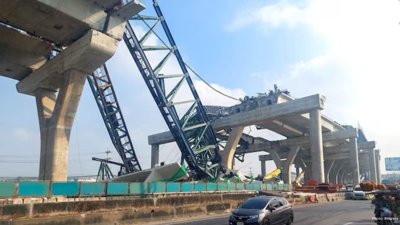
Post by : Armust Desk
The Greater Visakhapatnam Municipal Corporation (GVMC) is taking a major step to solve the city’s water problems by fast-tracking plans for a massive desalination plant in Visakhapatnam. This plant is expected to produce 100 million litres of water per day, which will be a significant boost for both industrial and domestic water supplies. The city has been facing increasing pressure on its water resources due to rising industrial demand, population growth, and seasonal water shortages.
Water is a basic necessity, and access to clean and safe drinking water has become a critical issue for cities across India. Visakhapatnam, a rapidly growing industrial hub on the east coast, has long relied on reservoirs, groundwater, and rivers for its water supply. However, industrial growth and urban expansion have caused water demand to rise sharply. To address this challenge, GVMC has decided to invest heavily in desalination technology, which converts seawater into safe drinking and industrial water.
Project Overview
The proposed desalination plant is estimated to cost approximately ₹1,200 crore. GVMC plans to implement the project under a Public-Private Partnership (PPP) model. This means the municipal corporation will provide the land and some support services, while private partners will take responsibility for financing, building, and operating the plant. Andhra Pradesh Urban Infrastructure and Asset Management Limited (APUIAML) will also be involved in supervising and coordinating the project.
The technical partner chosen for this project is IDE Technologies from Israel, a company known globally for its expertise in large-scale desalination plants. IDE Technologies has previously completed similar projects in other parts of India, including Mumbai and Tamil Nadu, where desalination plants have successfully supplied water to industrial and residential areas. With this experience, the company is expected to deliver an efficient, modern, and reliable plant for Visakhapatnam.
Environmental Considerations
One of the key features of the new plant is its focus on environmental sustainability. GVMC has announced that a 20-megawatt solar energy system will power the desalination plant. This move ensures that the project uses clean, renewable energy rather than relying entirely on fossil fuels, thereby reducing greenhouse gas emissions and minimizing the environmental footprint of the facility.
Water desalination can be energy-intensive, and using solar energy will help make the plant more cost-effective and environmentally friendly. By combining modern technology with renewable energy, GVMC is setting an example for other cities facing similar water challenges.
Land and Infrastructure Requirements
The desalination plant will require around 25 acres of land. This space will not only house the water treatment facilities but also storage tanks, access roads, and supporting infrastructure needed to operate the plant efficiently. GVMC will provide this land and coordinate with local authorities to ensure smooth construction and operation.
Private partners will be responsible for financing the project, installing the equipment, and managing day-to-day operations. This partnership will allow the municipal corporation to deliver water solutions without putting an excessive burden on its budget while ensuring the plant is constructed using the latest technology and international best practices.
Addressing Water Scarcity
Water scarcity has been a persistent problem in Visakhapatnam, particularly in industrial zones and suburban areas such as Madhurawada and Bheemili. Industries in these regions consume large quantities of water, which often limits the supply available for households. Seasonal shortages, especially during summer months, have made water distribution a serious concern for city authorities.
The desalination plant aims to solve this issue by providing a reliable source of water for industrial use. By diverting seawater through modern treatment processes, industries will have access to the water they need without tapping further into rivers or groundwater resources. This, in turn, will ensure that clean drinking water is preserved for domestic use, addressing the needs of the city’s growing population.
It is expected that the plant’s capacity of 100 million litres per day will be able to meet the shortfall caused by industrial consumption and seasonal shortages. Over time, the plant could even expand to supply additional areas as demand grows, making it a long-term solution for water sustainability in Visakhapatnam.
Implementation Timeline
GVMC is currently in the process of finalizing proposals and selecting contractors for the project. Once the Public-Private Partnership agreement is signed, the construction of the desalination plant will begin in phases. The first phase will prioritize industrial water supply to ensure that local businesses continue to operate smoothly without water disruptions.
Subsequent phases will focus on supplying water to residential areas. By approaching the project in stages, GVMC aims to provide immediate relief to water-stressed industries while gradually improving domestic water availability. Officials have emphasized that careful planning, monitoring, and coordination with all stakeholders will be essential for the project’s success.
Benefits of the Project
The desalination plant is expected to bring multiple benefits to Visakhapatnam:
Sustainable Water Supply: By treating seawater, the city can secure a reliable water source for both industrial and domestic use.
Industrial Growth: Industries will have access to water without straining municipal resources, supporting economic development.
Environmental Protection: Solar power and modern technology will minimize the carbon footprint and reduce dependence on traditional water sources.
Reduced Water Scarcity: Households will have more consistent access to clean drinking water, especially during dry months.
Long-Term Planning: The plant represents a forward-thinking approach to managing water resources as the city continues to grow.
GVMC’s initiative to build a ₹1,200 crore desalination plant in Visakhapatnam is a landmark project for the city. It reflects a proactive approach to addressing water scarcity and planning for the city’s future needs. By combining advanced desalination technology with renewable energy, GVMC aims to create a sustainable water solution that benefits both industries and residents.
This project also highlights the importance of public-private partnerships in tackling large-scale infrastructure challenges. With careful planning and implementation, the desalination plant could serve as a model for other cities in India facing similar water challenges. It is a clear signal that Visakhapatnam is committed to sustainable growth, environmental responsibility, and providing its citizens with reliable access to one of the most essential resources: water.
GVMC, Visakhapatnam, desalination plant, water supply, industrial water










Advances in Aerospace Technology and Commercial Aviation Recovery
Insights into breakthrough aerospace technologies and commercial aviation’s recovery amid 2025 chall

Defense Modernization and Strategic Spending Trends
Explore key trends in global defense modernization and strategic military spending shaping 2025 secu

Tens of Thousands Protest in Serbia on Anniversary of Deadly Roof Collapse
Tens of thousands in Novi Sad mark a year since a deadly station roof collapse that killed 16, prote

Canada PM Carney Apologizes to Trump Over Controversial Reagan Anti-Tariff Ad
Canadian PM Mark Carney apologized to President Trump over an Ontario anti-tariff ad quoting Reagan,

The ad that stirred a hornets nest, and made Canadian PM Carney say sorry to Trump
Canadian PM Mark Carney apologizes to US President Trump after a tariff-related ad causes diplomatic

Bengaluru-Mumbai Superfast Train Approved After 30-Year Wait
Railways approves new superfast train connecting Bengaluru and Mumbai, ending a 30-year demand, easi